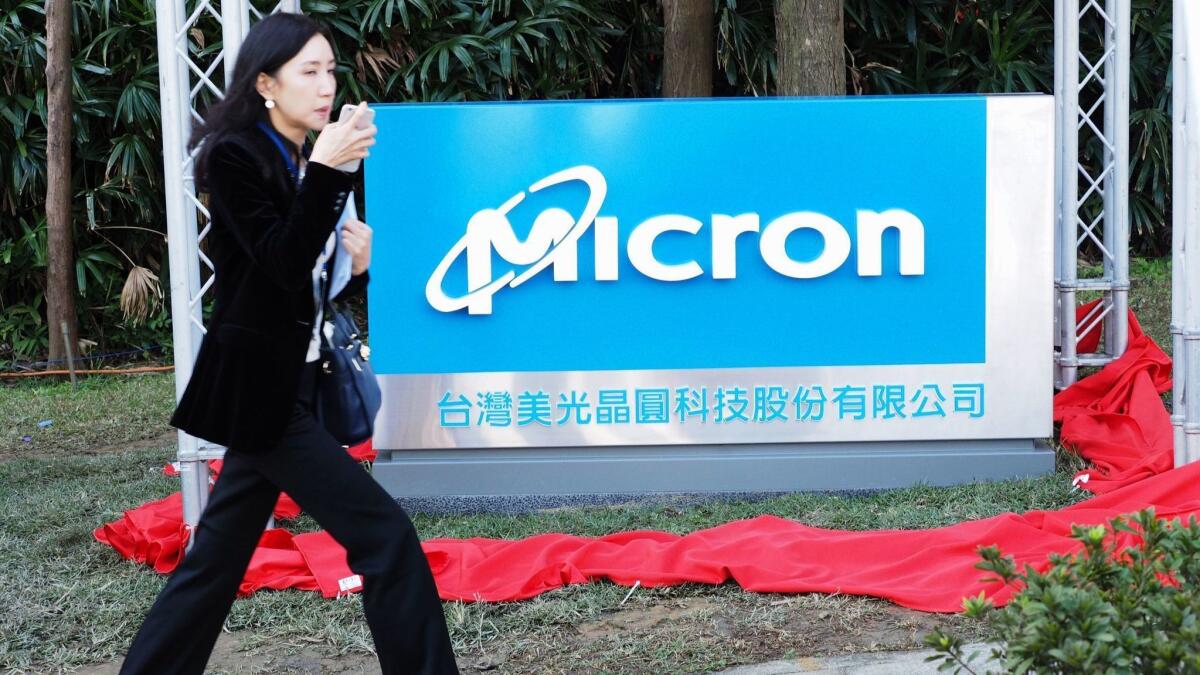U.S. companies find ways around Trump’s Huawei blacklist

U.S. technology companies have resumed selling certain products to Huawei Technologies Co. after concluding there are legal ways to work with the Chinese telecom giant in spite of its inclusion on a Trump administration blacklist.
Micron Technology Inc., the largest U.S. maker of computer memory chips, said Tuesday that it had started shipping some components to Huawei after its lawyers studied export restrictions. Intel Corp., the largest microprocessor maker, has also begun selling to Huawei again, according to a person familiar with the matter. It’s not clear how many other suppliers have reached the same conclusion.
The U.S. Commerce Department added Huawei last month to what’s known as an entity list, a move designed to bar the Chinese company from buying American components and software. The Trump administration said Huawei helps China’s government in espionage and represents a security threat — allegations the company denies. Commerce Department and White House officials are frustrated that companies have resumed Huawei shipments, according to another person familiar with the matter. The White House didn’t immediately respond to a request for comment.
The chipmakers are taking advantage of certain exceptions to the export restrictions. Even when companies have headquarters in the U.S., they may be able — through ownership of overseas subsidiaries and operations — to classify their technology as foreign, according to Cross Research analyst Steven Fox. If less than 25% of the technology in a chip originates in the U.S., for example, then it may not be covered by the ban, under current rules.
“It took them weeks to figure this out,” Fox said. “What they did was look at the laws and the rules and applied them to their business.”
Micron, which also reported earnings Tuesday that beat analysts’ estimates, saw its stock soar 13.3% on Wednesday. Intel, Nvidia Corp. and Qualcomm Inc. also rallied. Asian chipmakers gained too.
Micron has operations all over the world, some added through acquisitions, and it owns plants in Singapore, Japan and Taiwan. Intel has factories in China and Ireland and a major design center and production facility in Israel. The company declined to comment.
Companies can legally continue some shipments to Huawei under what’s known as the de minimis rule, said Kevin Wolf, former head of the Commerce Department’s export control section.
“Commodities made overseas from U.S.-origin technology are only subject to the entity list prohibitions if the technology and commodity are sensitive items controlled for ‘national security’ reasons,” Wolf said. “But a commodity made overseas from less sensitive U.S.-origin technology is not subject to the entity list prohibitions.”
The de minimis threshold is 25%, according to the Commerce Department.
National security hawks in the Trump administration thought inclusion on the entity list would ratchet up pressure on Huawei, but they didn’t understand or misinterpreted the existing rules, people familiar with internal deliberations said. Those advisors didn’t fully grasp the limits of export controls in constricting supply chains that reach deeply into China.
In a conference call discussing his company’s earnings, Micron Chief Executive Sanjay Mehrotra declined to explain his analysis, despite repeated questions. In a brief interview after the call, he also wouldn’t elaborate and said he hopes the U.S. and China quickly resolve their trade dispute.
The Semiconductor Industry Assn. trade group put out a statement aimed at supporting its members’ right to keep working with an important customer: “SIA companies are committed to rigorous compliance with U.S. export control regulations,” it said. “As we have discussed with the U.S. government, it is now clear some items may be supplied to Huawei consistent with the Entity List and applicable regulations.”
The trade war and Huawei sanctions put U.S. chipmakers in a tough position. The companies need to comply with new rules in their home country while at the same time navigating the intricacies of business in China, an increasingly crucial market. More than 60% of the $470 billion worth of chips sold last year went through China.
If Huawei’s U.S. suppliers can resume some sales, that may prevent the financial hit many have expected.
Even though these companies have found ways to legally keep exporting some of their products to Huawei, they are prohibited from providing post-sale support such as software updates, repairs and installation help. That means that while an item in a box can be shipped from Taiwan to China, for example, the company still can’t provide information on software repairs or assistance from Silicon Valley. Wolf said that can be a significant handicap.
Finding legal ways to sidestep restrictions is taking on added significance for U.S. companies as the Trump administration expands curbs on technology exports to China. Last week, the Commerce Department blacklisted five Chinese entities over accusations they were developing supercomputers for military applications. Some Chinese video surveillance firms also may be barred from U.S. suppliers.
The Commerce Department could easily change the definition of what foreign-made items are subject to the regulations. That change wouldn’t require Congressional approval, Wolf said. Still, it’s not clear if the Trump administration is looking into making such changes.
“Micron will continue to comply with all government and legal requirements just as we do in all our operations globally,” Mehrotra said. “Of course, we cannot predict whether additional government actions may further impact our ability to ship to Huawei.”





